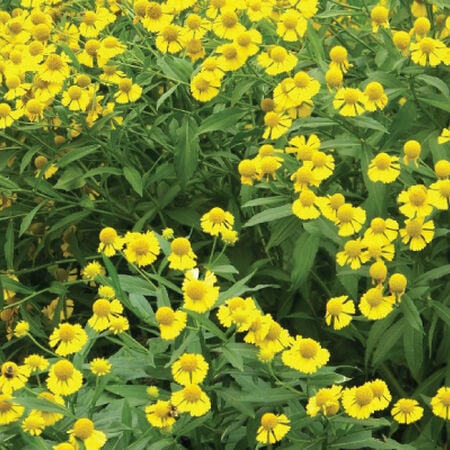Sneezeweed, Helenium Seeds
Key Attributes
Key Attributes
Product Details
Weight
0.01Depth
0.15Height
4.5Width
3.25Plant Height
3-5'Botanical Name
Helenium autumnaleSeed Type
SeedAdditional Characteristics
Attracts Pollinators, Deer ResistantSeeds Per Gram
4,411Seeds Per Pound
2,000,000Packet
100 SeedsSow Depth
1/8"Seeds Per Ounce
125,000Breed
Open-pollinatedSun
Full SunLife Cycle
PerennialSow Method
TransplantCategories
FlowersDays To Maturity (# Days)
90Components
Growing Instructions
![]() Learning Download: How to Grow Helenium
Learning Download: How to Grow Helenium
Helenium is also commonly known as Sneezeweed and blooms bright yellow flowers that resemble daisies. It is a perennial, but it will live for about four to five years.
Before Planting: Sow Helenium seeds indoors 8 to 10 weeks before the last frost. Transplant the flowers outside when the air is cool and there is still possibility of a frost.
Planting: Direct sowing can take place in the early spring or the early fall. When planting, barely cover the seeds with soil.
Watering: Keep the soil moist between watering.
Fertilizer: Feed Helenium once each spring with a balanced, slow-release fertilizer. Make sure you apply the fertilizer just before the new growth begins.
Days to Maturity: Helenium will bloom from the late summer to early fall.
Harvesting: Helenium can add to a bouquet’s appearance due to its clustered bloom and tall stems.
Tips: In the late June, cut the Helenium plants back to half of its height. This will make the foliage thicker and encourage more flowering the following spring.
Shipping Schedule
Our Seed Promise
 "Agriculture and seeds" provide the basis upon which our lives depend. We must protect this foundation as a safe and genetically stable source for future generations. For the benefit of all farmers, gardeners and consumers who want an alternative, we pledge that we do not knowingly buy or sell genetically engineered seeds or plants.
"Agriculture and seeds" provide the basis upon which our lives depend. We must protect this foundation as a safe and genetically stable source for future generations. For the benefit of all farmers, gardeners and consumers who want an alternative, we pledge that we do not knowingly buy or sell genetically engineered seeds or plants.
The mechanical transfer of genetic material outside of natural reproductive methods and between genera, families or kingdoms, poses great biological risks as well as economic, political, and cultural threats. We feel that genetically engineered varieties have been insufficiently tested prior to public release. More research and testing is necessary to further assess the potential risks of genetically engineered seeds. Further, we wish to support agricultural progress that leads to healthier soils, to genetically diverse agricultural ecosystems, and ultimately to healthy people and communities.
To learn more about the "Safe Seed Pledge" please visit www.councilforresponsiblegenetics.org.

